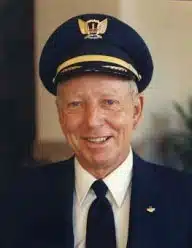Al Haynes, the former United Airlines captain renowned for his heroic actions during the 1989 emergency landing of United Flight 232, has passed away. His extraordinary skills, leadership, and composure in the face of a catastrophic situation left an indelible mark on aviation history and safety protocols worldwide.
On July 19, 1989, United Flight 232, a DC-10, was en route from Denver to Chicago when its tail-mounted engine suffered an uncontained failure, severing hydraulic lines and leaving the aircraft with no traditional flight controls. Captain Haynes, alongside First Officer William Records, Flight Engineer Dudley Dvorak, and DC-10 instructor pilot Dennis Fitch, managed to maintain partial control of the plane by using differential engine thrust—a technique largely untested in such scenarios.
The flight crew’s teamwork and Haynes’ calm demeanor under immense pressure have since been hailed as exemplary. Despite their efforts, the plane crash-landed at Sioux Gateway Airport in Iowa. Tragically, 111 of the 296 people onboard lost their lives, but the survival of 185 passengers was a testament to the crew’s skill and determination. Aviation experts have often remarked that without Haynes’ leadership, the outcome could have been far worse.
Al Haynes’ experience as a pilot and his humility played significant roles during and after the incident. In the aftermath, he became a sought-after speaker, sharing his insights on the importance of teamwork, preparation, and communication. He often credited the survival of so many to the collaborative efforts of the crew, the training they received, and the assistance of air traffic controllers and emergency responders.
Born in Paris, Texas, in 1931, Haynes had a long and distinguished career in aviation. Before joining United Airlines in 1956, he served as a pilot in the U.S. Marine Corps. His extensive experience and dedication to safety resonated throughout his career. Following his retirement, Haynes used his platform to advocate for improvements in aviation safety. The lessons learned from Flight 232 led to significant changes in training protocols, emergency response strategies, and aircraft design, making air travel safer for millions.
Haynes’ humility was a defining trait. Despite being lauded as a hero, he often deflected credit, emphasizing the collective effort of his crew and others involved in the rescue. His legacy lives on not only in the survivors of Flight 232 but also in the countless lives potentially saved by the safety enhancements inspired by the incident.
Al Haynes’ story is one of courage, resilience, and the power of teamwork. His actions during one of aviation’s most challenging emergencies exemplify the highest standards of his profession. His passing marks the loss of a remarkable individual whose contributions will be remembered for generations.
